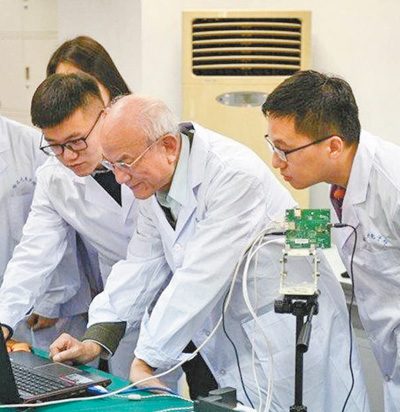
Liu Yongtan (second from right) studies radar technology in a laboratory of Harbin Institute of Technology, Northeast China's Heilongjiang Province. (Photo: Xinhua)
"In my whole life, I did just one thing, which was to turn my childhood dream into a reality. I'm satisfied by this," said Liu Yongtan.
Born in 1936, Liu is one year younger than the world's first radar, but has spent a lifetime catching up, eventually leading the cutting edge of global development of radar technology.
Liu, a professor at the Harbin Institute of Technology in Northeast China's Heilongjiang Province, was elected an academician of the Chinese Academy of Sciences in 1991 and academician of the Chinese Academy of Engineering in 1994. Through his tireless efforts, China revolutionized its under-sea monitoring and detection ability.
Theoretical foundation
Born in Nanjing during the War of Resistance against Japanese Aggression (1931-45), Liu grew up caring about the rise and fall of his country. He remembered that his father once told him: "The country is poor and weak. You should try to change this situation when you grow up."
Liu was admitted to Harbin Institute of Technology in 1953 via college entrance exams. Although the youngest in the class, Liu was nicknamed "junior teacher" for his breadth of knowledge. In 1958, after further study at Tsinghua University in Beijing, Liu returned to Harbin as a faculty member and participated in establishment and research at the radio engineering department.
After reform and opening-up in 1978, Liu went to the UK among one of the first groups of Chinese government-sponsored students to study abroad. Upon graduation, his supervisor invited him to stay there but Liu left the UK determined to develop a new system of radar for China.
Maritime radar detection hinges on the range. Liu's promotion of a new radar system enlarged that range and so boosted China's national security.
Liu had early doubts, he admitted, but stuck at it. After thousands of experiments and rounds of data analysis, his team made breakthroughs in key theoretical concepts such as sea clutter background target detection, long-distance detection signal and system model design. In short, Liu and colleagues created a complete theoretical system for a new type of radar.
In 1989, Liu's team built the first Chinese new-system radar station. An appraisal found "the research results of the new system radar are at the international leading level." In 1991, the project won the National Award for Science and Technology Progress.
Coastal defense
Theory must be put into practice, Liu believed. A new partner on the project required Liu's new radar system be able to conduct all-round monitoring of long-range targets. With this added challenge in mind, Liu knew that it would be even tougher to transform his team's laboratory experiment into a complete national radar system.
In 1997, Li's team officially started engineering on the new radar system. He led the team working more than 10 hours a day, munching on bread when hungry.
After thousands of tests and improvements, Liu's team completed China's first new radar system in the fall of 2011. The radar boasted full-time, all-weather and long-range detection capabilities, which represented a breakthrough in China’s long-range maritime detection technology.
The radar reportedly performed at an international level based on globally advanced core technology, making China one of a few countries to master this type of radar.
In 2015, Liu won the National Award for Science and Technology Progress for the second time.
Liu's radars today line China's coastline, playing an important role in aerospace, navigation, fisheries, coastal oil development, marine climate forecasting and coastal economic zone development.
Fostering talent
For more than 60 years, Liu has been both scientist and teacher. He sees research the same as teaching. Projects are a classroom for fostering talent where students with innovative ideas drive forward the science.
Liu has mentored more than 80 graduate students including more than 40 doctorates. They have gone on to become generals, academicians, university presidents, chief engineers of national defense institutes and founders of high-tech technology companies. It might be said that Liu’s students are the backbone of modern China.
(Translated by Lyu Doudou, edited by Dong Feng; The original Chinese story was published in People's daily, September 29,2021)


